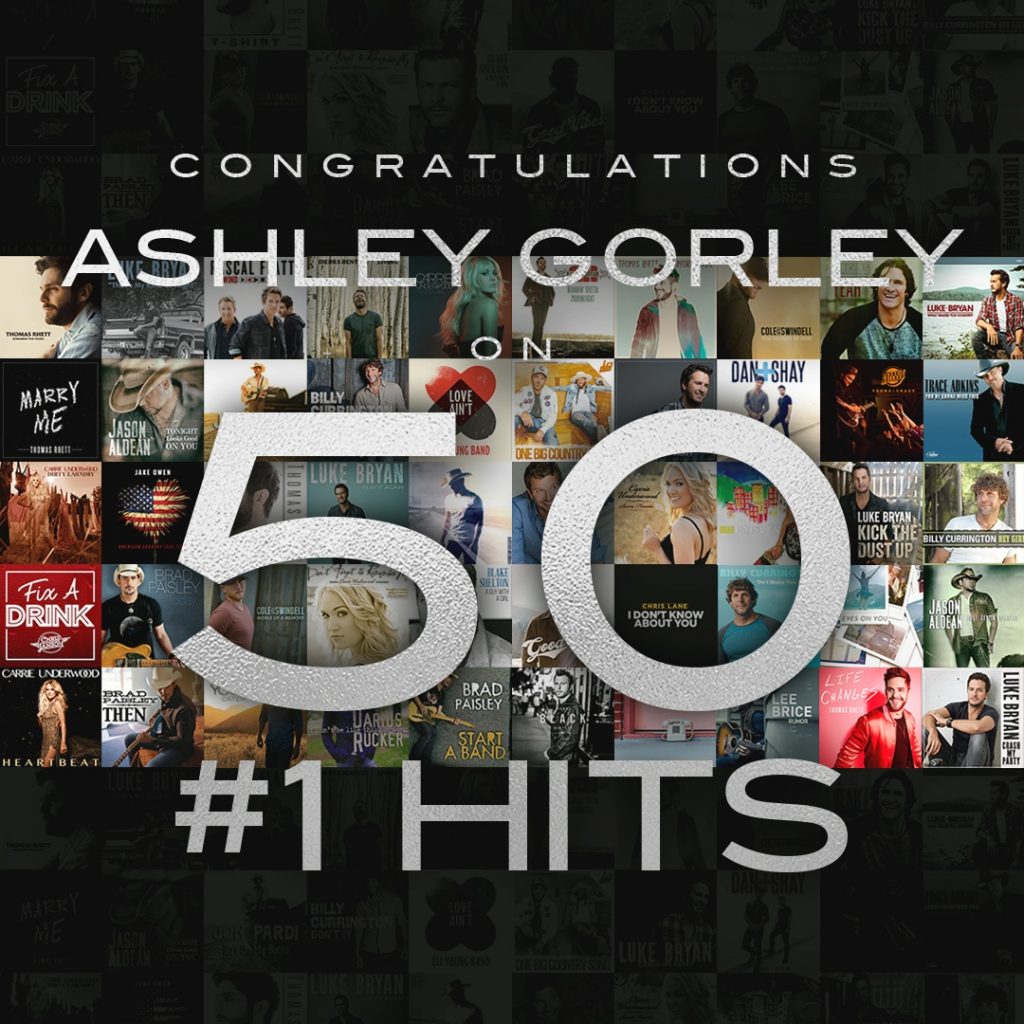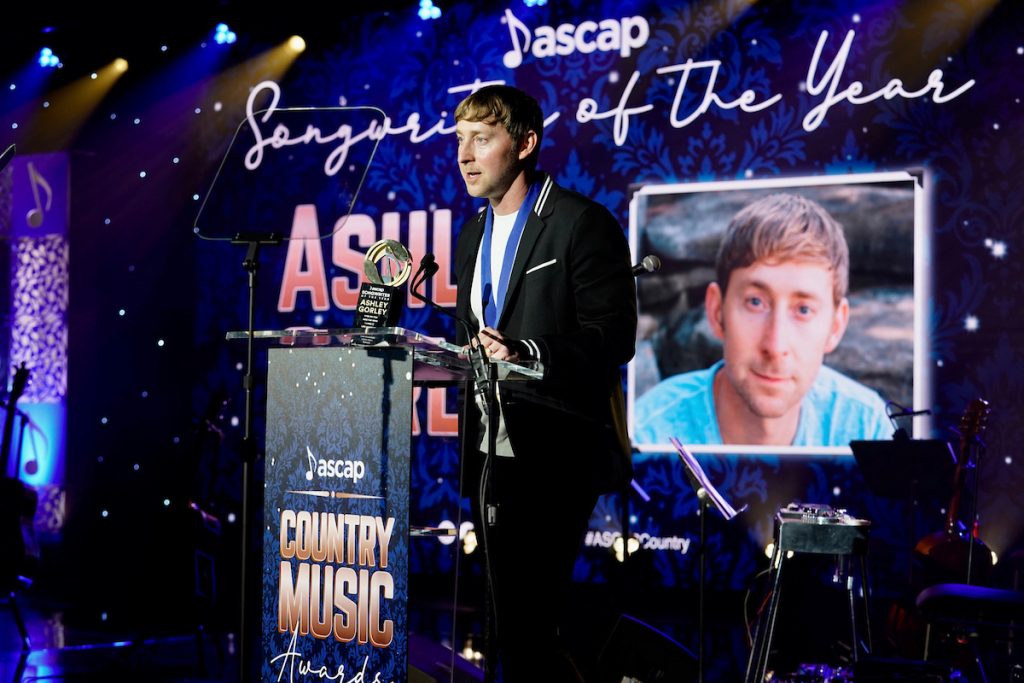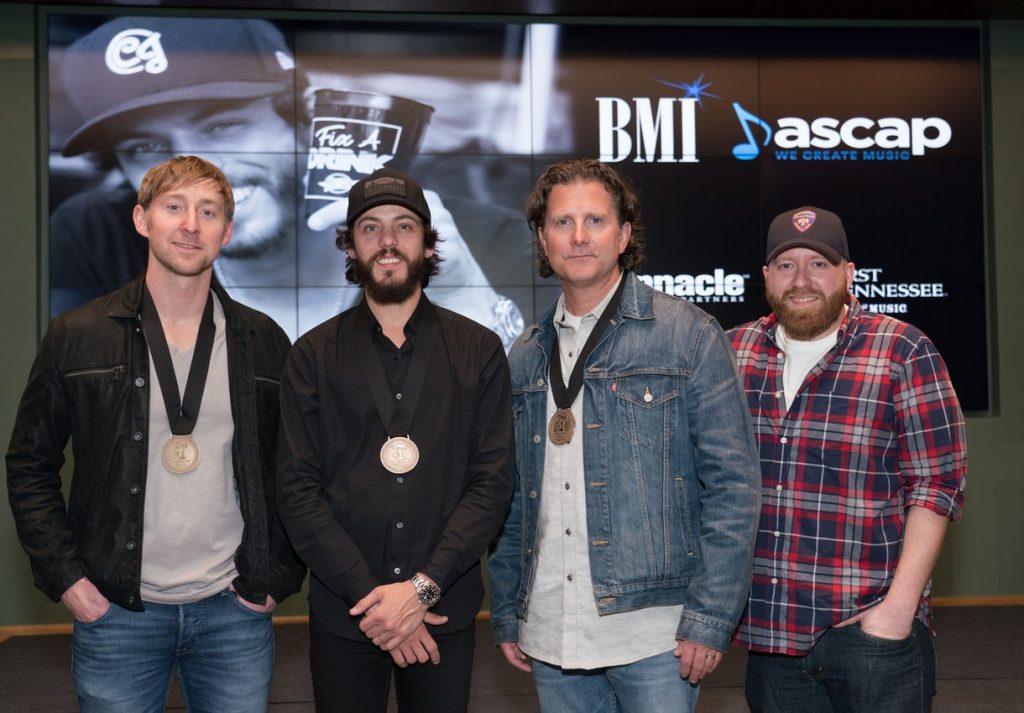The Writers Round With Ashley Gorley
The Academy of Country Music’s Songwriter of the Year nominee is a co-writer on 50 No. 1 country singles including LOCASH's “One Big Country Song,” Sam Hunt’s “Hard To Forget” and Cole Swindell’s “Middle of a Memory.”

Welcome to the Writers Round, a monthly column where Sounds Like Nashville sits down with Nashville-based songwriters and learns about each writer’s journey to Music City. This month, Ashley Gorley sheds some light into his life as a songwriter as well as shares the stories behind some of his many hits including LOCASH’s “One Big Country Song,” Trace Adkins’ “You’re Gonna Miss This” and Cole Swindell’s “Single Saturday Night.”
Ashley Gorley has accomplished a feat no other songwriter has achieved. In August, he became the only songwriter in any genre to earn 50 No. 1 songs in the history of the Mediabase and Billboard Country Airplay charts.
Over the span of 14 years, Gorley saw success with acts like Carrie Underwood, Luke Bryan, Thomas Rhett and Cole Swindell. His 50 chart toppers were recorded by 30 different country artists, something the reigning seven-time ASCAP Songwriter of the Year is especially proud of. He says the variety of acts he’s written with and the constant challenge of penning new music keeps him inspired as a creative.
“It’s a blessing. It reminds me that hopefully I know what I’m doing and it gives me confidence to keep going,” Gorley tells Sounds Like Nashville of the accomplishment. “That was never a number I set out to get … I still feel like I haven’t arrived and I think that’s the key: knowing that I’m not there yet and never will be. That’s what keeps me grinding.”

Gorley knew he wanted to work in the music business as a child growing up in Kentucky. It took some time before he fell into songwriting though. He says his early love of music was inspired by watching MTV countdowns and DJing during high school and various parties. He always aimed to make a playlist that would make everyone in the room happy. Obsessed with the radio, R&B, and country and pop countdown shows, Gorley says he was fascinated by hearing a song and wondered why people were reacting to it. His early song creations included DJing and trying to blend songs together while making up new music underneath each track.
“My first form of writing was blending and rearranging and then DJing and loving music in that way,” he says. “I got some terrible gear: drum machines, samplers and keyboards and things like that and just figured that out. Then I got a guitar. The first year I moved to Nashville I went and bought one. Some guy taught me [how to play guitar] at a college party.”
Enamored by music, he attended Nashville’s Belmont University and was enthralled with publishing. Fittingly, his favorite classes were publishing and copyright. During his time as a student, Gorley interned for five different companies where he fell in love with the publishing side of the music business. The songwriter recalls internships where he was tasked with spending time in the tape room listening to demos and typing out the lyrics to each song.

“I got to hear all the demos that came in. I got to watch them over the course of a year to see which ones actually got pitched, which ones were liked, which ones were held by artists and producers, and which ones were recorded and put out,” he says. During the process, he saw several hits happen. Mentors at the time included the late Jeff Carlton during Gorley’s internship at Hamstein Music.
In his early songwriting years, Gorley remembers writing two or three songs a day. He traveled to Los Angeles after transitioning into becoming more interested in production in college. After hearing the finished tracks the producers made there, he decided to focus more on lyric and melody instead of production because those were his strengths and he could provide the topline easily regardless of genre. He’d spend his days in class, working and interning, and at night he’d beg the publishing company he interned at to allow him to write after hours in the building.
“I would do co-writes at night, get home at midnight and do it all over again,” he says. “I got a lot of practice writing a lot of terrible songs. I got so excited about those sessions, demoed hundreds, probably a thousand songs, and fell in love with that process. I wrote professionally for seven years before I had a top 40 hit.”

Gorley graduated in 1999 and credits his songwriting mentors for taking him under their wings. Revered tunesmiths like Kelley Lovelace, Chris DuBois and David Lee Murphy guided the young writer and taught him the importance of rewriting and not to settle. He took all the tips he learned from each and success slowly started to happen for him. In 2006, he had his first No. 1 with Carrie Underwood’s single “Don’t Forget to Remember Me.” Gorley penned the song with Lovelace and Morgane Stapleton.
“I watched American Idol in real time. I’m a big fan of that show. I loved the first two or three seasons and remember watching her and thinking, ‘I’ve gotta get a song with this girl. She’s amazing!’ And then we did it,” he says. “So then it was just like, ‘Okay, this can actually happen.’ I’ve never met her and she still recorded a song of mine … The lyric was very true and honest. A lot of those things happened to me when I was leaving for school and happened for Morgane and they connected with Carrie.”
Gorley says the success of “Don’t Forget to Remember Me” was his first realization that other people feel the way he does and that inspired him to keep writing. Between 2007-2008 he had three singles on the chart at the same time with Trace Adkins’ “You’re Gonna Miss This,” Brad Paisley and Keith Urban’s duet “Start a Band” and Darius Rucker’s “It Won’t Be Like This For Long.”
“You’re Gonna Miss This” was named ASCAP’s Country Song of the Year in 2009. Gorley says the song came from a very real, honest place in his life about being a father of two at the time. It was also a song that made him fall in love with country music.
“At that point I was hooked, and then I had a couple of years where I had nothing out at all after that. Then God taught me the lesson of, ‘Hey, this isn’t a guaranteed thing here,’” he says. “I finally feel like I broke through a barrier in about 2010, 2011 and started consistently having songs come out.”
Gorley credits early success with Luke Bryan (“That’s My Kinda Night,” “Play It Again”), Thomas Rhett (“Unforgettable,” “Marry Me”) and Cole Swindell (“You Should Be Here,” “Middle of a Memory”) as simply being able to speak the artist’s language. Despite his 50 No. 1 hits, Gorley doesn’t see himself as a veteran songwriter. Instead, he continues trying to find new ways to say things with different melodic and lyrical turns on every song he writes. Sometimes while writing one song he’ll be inspired to stop and write another song from a line or a verse he just penned.
“So many times I’ve had hits where a line in song number one ends up being the title of song number two. A line and a verse of song one becomes a title of song number two and becomes a way better song,” he says, later referencing Cole Swindell’s “Middle of a Memory” as an example. After writing the bridge of one song with Swindell, the frequent collaborators were certain that could be a title of another song and they stopped writing that song to pen what would become “Middle of a Memory,” a No. 1 hit for Swindell.
“Cole is one of my favorites. He’s one of the nicest guys ever, and I was able to be part of ‘You Should Be Here,’ ‘Middle of a Memory’ and a bunch of other songs he’s recorded. Those all have stories,” he says. “‘You Should Be Here’ was a true story. We wrote that about his dad, just him and I on the back of a bus one night really late. That was a magical moment on the bus. Since then, I’ve seen people with tattoos of that title.”
Gorley admits that he has a bit of a nonconventional style when it comes to writing. It all comes out in waves for him, words and melodies together. While writing Swindell’s current single “Single Saturday Night” with Hardy and Mark Holman, Gorley says he wanted to write something about White Claw after seeing it everywhere.
“All I had was a couple of those little lines and then it just took off from there and became what it was. When we got done with it, I’m like, ‘This sounds exactly like Cole.’ That night we finished the demo Hardy and I both texted it to Cole, which I won’t do unless I literally think I have something that this person would be crazy not to record,” he says. “Cole was like, ‘Yep, on hold. Done.’ That’s really fortunate to have that relationship with Cole and he trusts me because I don’t send him a lot of stuff.”
Currently, Gorley has four singles on the country chart including Swindell’s “Single Saturday Night,” Lee Brice’s “One of Them Girls,” Kelsea Ballerini’s “Hole In the Bottle” and Runaway June’s “We Were Rich.” These singles follow his 50th No. 1 hit with LOCASH’s uplifting “One Big Country Song,” which he also penned with Hardy and Jesse Frasure.
“Hardy’s a great voice and an inspiring voice in the room and has great country turn of phrase. That was one where we literally were just like, ‘Hey, let’s write a great song and then figure out who it is for later,’” Gorley says. “It wasn’t something [Hardy] wanted for his album. It was just an idea. So we started playing grooves and Jesse started building a track and Hardy started playing guitar. I had some semblance of that idea in my phone. It seemed like a big celebration of, ‘Hey, life is just like a big country song’ and we took off on that idea.”
Gorley says LOCASH’s Chris Lucas and Preston Brust took ownership of “One Big Country Song” even though they didn’t write it themselves. The country duo aggressively worked it to radio, playing it at radio shows and championing it on the charts. In the age of Covid-19, Gorley says the song means even more to him now than when he first wrote it.
“They wanted it to be a big hit, and thought it deserved to be. Fortunately that song rose to the top. When songs go to No. 1, I still feel just as high as I did on the first one and still get just a big buzz from that and the accomplishment of that,” he adds. “Coincidentally with the Covid situation, I think people are longing for togetherness and for celebration of life and relatability. We’re all in this together is a little bit of an underlying theme. I think that that did probably take on a little bit of a new meaning. That [song] definitely seemed to be connecting. And, I mean, that’s all we can ask.”
Gorley’s 50 No. 1 country songs are below.
- “Don’t Forget To Remember Me” — Carrie Underwood
- “All-American Girl” — Carrie Underwood
- “You’re Gonna Miss This” — Trace Adkins
- “Start A Band” — Brad Paisley w/ Keith Urban
- “It Won’t Be Like This For Long” — Darius Rucker
- “Then” — Brad Paisley
- “American Saturday Night” — Brad Paisley
- “Good Girl” — Carrie Underwood
- “Crash My Party” — Luke Bryan
- “Runnin’ Outta Moonlight” — Randy Houser
- “Don’t Ya” — Brett Eldredge
- “Hey Girl” — Billy Currington
- “That’s My Kinda Of Night’ — Luke Bryan
- “Play It Again” — Luke Bryan
- “Rewind” — Rascal Flatts
- “Yeah” — Joe Nichols
- “I See You” — Luke Bryan
- “Just Gettin’ Started” — Jason Aldean
- “Don’t It” — Billy Currington
- “Tonight Looks Good On You” — Jason Aldean
- “Kick The Dust Up” — Luke Bryan
- “Young & Crazy” — Frankie Ballard
- “Nothin’ Like You” — Dan + Shay
- “Heartbeat” — Carrie Underwood
- “You Should Be Here” — Cole Swindell
- “T-Shirt” — Thomas Rhett
- “American Country Love Song” — Jake Owen
- “Middle of a Memory” — Cole Swindell
- “Dirty Laundry” — Carrie Underwood
- “A Guy With a Girl” — Blake Shelton
- “Dirt On My Boots” — Jon Pardi
- “Today” — Brad Paisley
- “Black” — Dierks Bentley
- “Do I Make You Wanna” — Billy Currington
- “Unforgettable” — Thomas Rhett
- “Fix a Drink” — Chris Janson
- “Marry Me” — Thomas Rhett
- “Life Changes” — Thomas Rhett
- “What Makes You Country” — Luke Bryan
- “Eyes On You” — Chase Rice
- “Love Ain’t” — Eli Young Band
- “Rumor” — Lee Brice
- “Living” — Dierks Bentley
- “I Don’t Know About You” — Chris Lane
- “Good Vibes” — Chris Janson
- “Remember You Young” — Thomas Rhett
- “Ridin’ Roads” — Dustin Lynch
- “Catch” — Brett Young
- “Hard To Forget” — Sam Hunt
- “One Big Country Song” — LOCASH


